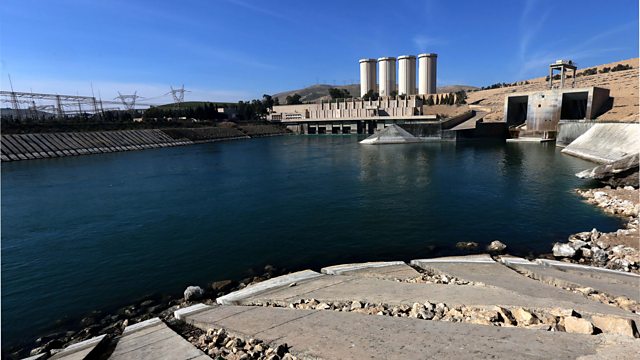Mosul Dam warning
Mosul Dam warning ; Pluto and Charon; Exomars; Curling ribbons; Indonesia forest fires; Storks and junk food
The largest dam in Iraq, the Mosul Dam, is in danger of collapsing according to a number of reports. It has been plagued with problems from the start as the dam was built on layers of limestone and gypsum - not only are these soluble but cavities form between the layers. The dam therefore needs constant grouting – the filling in of these cavities with a mixture of cement, clay and silicon – to stop it from collapsing. When ISIS took control of the dam they destroyed much of this grouting equipment and many staff did not return once local forces had regained control of the dam. . Professor Nadhir al-Ansari from the Lulea Technical University in Sweden explains what could happen if the dam collapses.
Pluto and Charon
New data has just been published from the New Horizons flyby of Pluto and Charon on July 14th 2015. Dr. Jeff Moore, Principle Co-investigator of the mission has been looking at the geology of the dwarf planet on the outskirts of our solar system. The most surprising finding appears to be the variety of landscapes on Pluto – with glacial flows, movement of large water ice blocks, craters, tall mounds – probably cryovolcanoes and ridges. Charon does not seem to be geologically active – the last time there were major tectonic changes was probably about 4 billion years ago!
Exomars
91�ȱ� Science Correspondent Jonathan Amos reports back from Exomars Mission Control.
Curling ribbons
Scientists from the University of Manchester can explain why a ribbon curls when we run a scissor blade down one side of it. As the ribbon bends around the blade, its outermost side stretches and permanently deforms, producing curls.
Indonesia forest fires
The dry season has begun again in Indonesia and so have the forest fires. Started deliberately to clear land for palm plantations, the fires led to record air pollution levels in the region last year. Now the Indonesian government has new measures in place to keep the fires under control.
Storks and junk food
New research shows that white storks in Portugal appear to be addicted to junk food and have stopped migrating to Africa for the winter. Dr. Aldina Franco from the University of East Anglia has found that since the 1980’s a population of white storks in Portugal has foregone migration as they can get all the food they need from open landfill sites in the south of the country. This means they can repair their nests and be ready to rear young much earlier than their migratory counterparts. The population has now exploded to about 14,000 birds. However new EU regulations will soon mean the end of open landfill sites, as countries will have to recycle their food waste. How this might affect the storks is unknown and Dr. Franco doesn’t know if the new non-migratory generations will be able to make their way back to Africa if the need arises.
(Photo: Mosul Dam. Deterioration of Iraq's largest dam could point to an impending catastrophic collapse which would unleash a wave that would devastate second city Mosul and flood much of the capital Baghdad. © Photo credit: SAFIN HAMED/AFP/Getty)
Presenter: Jack Stewart
Producer: Ania Lichtarowicz
Assistant: Lauren
Last on
More episodes
Previous
Broadcasts
- Thu 17 Mar 2016 20:32GMT91�ȱ� World Service Americas and the Caribbean, Online, UK DAB/Freeview & Europe and the Middle East only
- Thu 17 Mar 2016 21:32GMT91�ȱ� World Service Australasia, South Asia, East Asia & West and Central Africa only
- Fri 18 Mar 2016 02:32GMT91�ȱ� World Service Americas and the Caribbean
- Fri 18 Mar 2016 03:32GMT91�ȱ� World Service Online, East Asia, Europe and the Middle East & UK DAB/Freeview only
- Fri 18 Mar 2016 04:32GMT91�ȱ� World Service South Asia
- Fri 18 Mar 2016 05:32GMT91�ȱ� World Service Australasia
- Fri 18 Mar 2016 07:32GMT91�ȱ� World Service East and Southern Africa & Europe and the Middle East only
- Fri 18 Mar 2016 13:32GMT91�ȱ� World Service Online & UK DAB/Freeview only
- Fri 18 Mar 2016 14:32GMT91�ȱ� World Service East Asia, East and Southern Africa, Europe and the Middle East, South Asia & West and Central Africa only
Podcast
-
![]()
Science In Action
The 91�ȱ� brings you all the week's science news.


